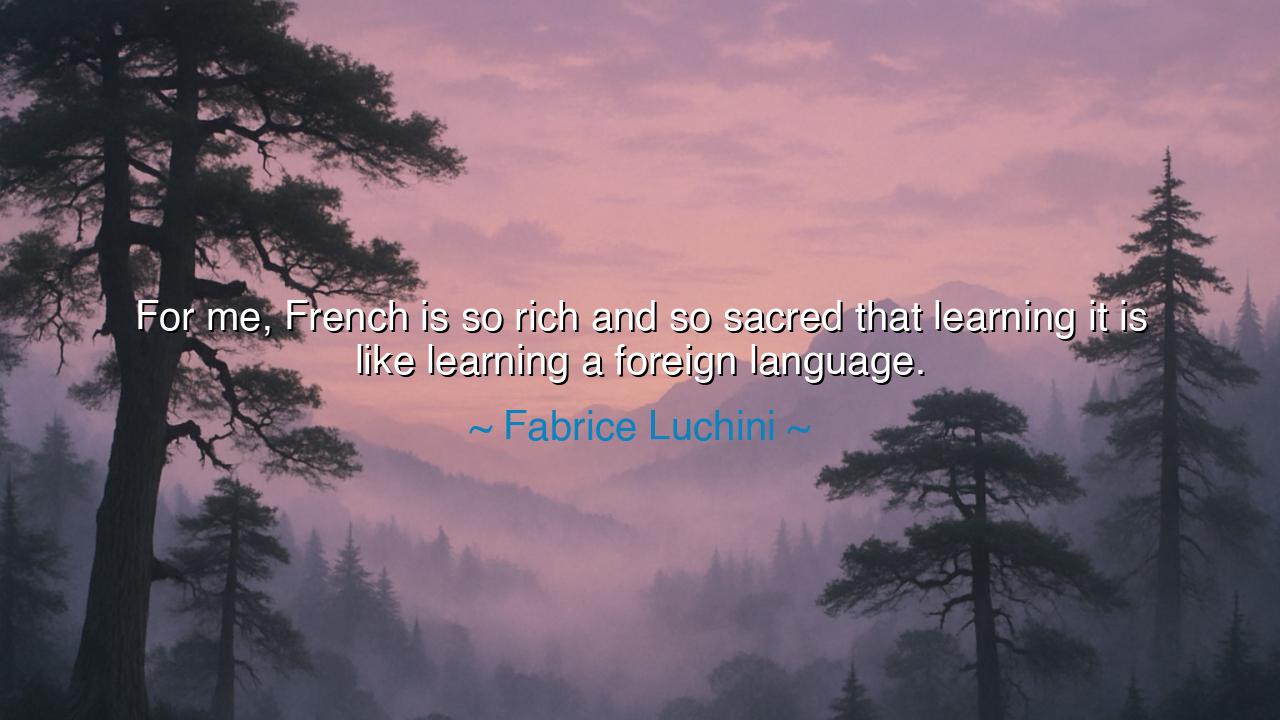
For me, French is so rich and so sacred that learning it is like
For me, French is so rich and so sacred that learning it is like learning a foreign language.






The words of Fabrice Luchini—“For me, French is so rich and so sacred that learning it is like learning a foreign language.”—shine like a confession from a man who stands in awe of his own mother tongue. In this reflection lies both humility and reverence: the recognition that language is not merely a tool, but a living temple. To Luchini, French is not something one simply speaks—it is something one must earn, study, and rediscover, as though approaching a divine mystery. His words remind us that mastery of language is not possession, but pilgrimage.
The origin of this feeling lies in Luchini’s lifelong devotion to literature and performance. Known for his impassioned readings of Molière, La Fontaine, and Flaubert, he has spent his life wrestling with words, shaping sentences as though they were sculptures of breath. For such an artist, the French language is not familiar; it is endlessly demanding. Every word carries centuries of history, every syllable a pulse of rhythm and meaning. To call it “foreign” is not to distance himself from it, but to acknowledge its vastness—the way a climber looks up at a mountain he has ascended a hundred times and still feels small before it.
In the ancient world, language was sacred. The Egyptians believed that to name something was to summon its spirit; the Greeks held that the poet’s tongue could touch the divine. Luchini’s statement resurrects that same reverence. He reminds us that words are not just sound—they are carriers of truth, emotion, and memory. To speak beautifully is to participate in creation itself. Thus, when he says that learning French feels like learning a foreign tongue, he speaks as one who knows that true fluency is not mechanical; it is spiritual. The sacredness of expression demands not just skill, but devotion.
Consider the story of Dante Alighieri, who took the vulgar Italian of his time and transformed it into poetry that could stand beside Latin, the language of scholars and priests. Through discipline and love, he gave voice to a nation’s soul. Yet Dante himself often wrote of the difficulty of expressing eternal truths in mortal words. Like Luchini, he recognized that language transcends the speaker—that each sentence we form reaches beyond our grasp, toward something higher, purer, and more luminous.
There is also in Luchini’s quote a warning against complacency. Many believe that fluency grants mastery, that speaking one’s native tongue requires no reverence. But the wise know that familiarity often dulls wonder. To treat a language as sacred is to never stop learning it—to listen deeply, to study its roots, to honor its rhythm and logic. The grammar and syntax he reveres are not chains, but architecture; not barriers, but the bones of beauty itself. The artist who ignores them may speak, but he will not sing.
This philosophy extends beyond French. Every tongue, if studied with care, reveals its soul—its way of seeing the world. To learn a language, whether one’s own or another’s, is to enter a new way of feeling. The French that Luchini describes is not merely the language of his nation; it is the landscape of his thought, the vessel of his identity. In rediscovering it, he rediscovers himself. This is why he calls it “foreign”—because the self, too, is always partly unknown, and language is the key by which we come to know it.
From this, a great lesson emerges: approach words with reverence. Whether we speak or write, let us do so with care, for every word shapes the world around us. Let us not rush to express, but to understand; not to perform, but to honor. Like Luchini, let us treat our languages—our mother tongues and those we learn—as sacred spaces, worthy of patience, respect, and wonder.
For in the end, to truly learn a language—any language—is to listen to the soul of humanity. Each word is a thread connecting past to present, heart to heart, and thought to eternity. And as Fabrice Luchini reminds us, even the tongue we are born into remains an eternal mystery—forever rich, forever sacred, forever foreign to those who still dare to learn.






AAdministratorAdministrator
Welcome, honored guests. Please leave a comment, we will respond soon